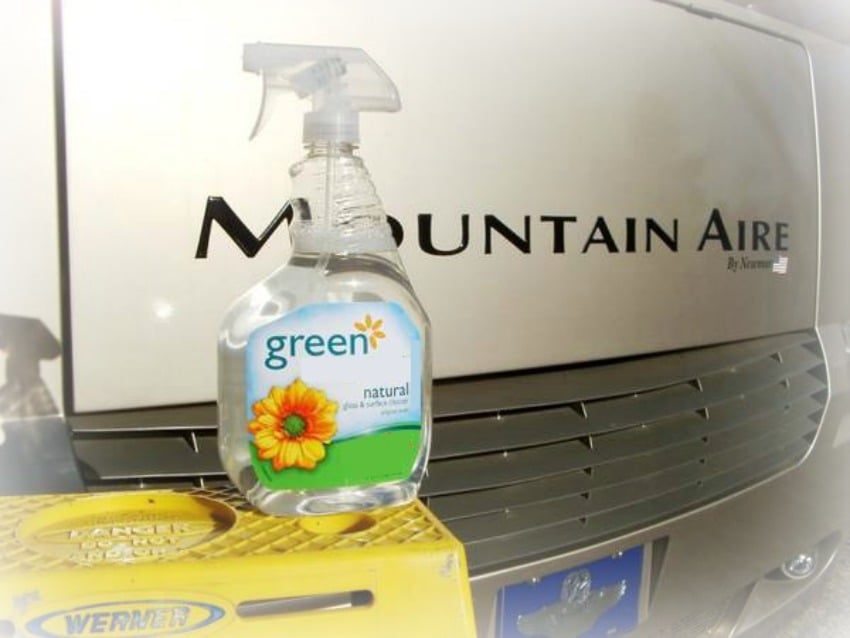Gas-guzzling RVs appear to have a large carbon footprint on the planet. But the reality is that RVs are greener than most people realize. RVs use less water than sticks-and-bricks house and consume less electricity too.
If you want to make an even bigger statement about green RVing, try these three DIY RV cleaners made with common natural products found in your home.

How green are your RV cleaning products?
You don’t need a lot of cash or equipment to make eco-friendly DIY RV cleaners. These popular alternatives to store-bought cleaning supplies will keep your rolling home free of nasty chemicals, toxic fumes, and excess packaging.
As a bonus, you’ll save money and be kind to nature. What could be better?
Ditch the stink with homemade RV toilet chemicals
The GEO Method is an easy cheap way to keep holding tanks odor-free. This RV holding tank deodorizer recipe controls odors and keeps tanks sensors working properly. All you need for it is:
- Liquid or powdered water softener (Calgon, for example)
- Phosphate-free powdered laundry detergent or dish soap
- Household bleach
This DIY holding tank recipe works because the water softener and detergent keeps solids from building up on your tank’s interior sidewalls. The household bleach is used for odor control, but don’t panic: small doses of household bleach won’t harm septic systems or plastic plumbing fixtures (it’s packaged in a plastic bottle after all).
The GEO Method is easy to make and simple to use. Complete instructions and usage tips are available in this DoItYourselRV.com article, “Homemade RV Holding Tank Deodorizer Obliterates Odors”.
Cut grease with a DIY citrus degreaser
RVing means getting comfortable with grease. But when you’re ready to remove it, did you know that many store-bought citrus degreaser products are toxic?
According to the website SierraEEG.com, “Citra-Solv concentrate is 85 to 95 percent d-limonene. That the oils are derived from citrus implies safety, but sprayed into the air, they can react with trace levels of ozone air pollution to form ultra-fine particles that penetrate deep into the lungs and form formaldehyde, which the U.S. government classifies as a known human carcinogen.”
Forget toxic store-bought citrus degreasers, just make your own with baking soda and orange or lemon essential oil. Blend 2 cups of warm water, 1 tablespoon of baking soda and 20 drops of citrus oil into a spray bottle and you’re all done!
Spring clean with a green DIY RV wash
Spring is here and now’s the time to get your RV ready for the road. When your annual RV maintenance chores are done it’s time to spit-shine the RV exterior. But don’t reach for those typical RV wash products.
Many contain phosphates that harm waterways. Skip the toxic RV wash and make a homemade RV wash with a blend of eco-friendly baby shampoo and vinegar instead.
Have fun and experiment with your own DIY RV cleaner recipes and others found on the web. Some work better than others, but whatever the result, at least you can take satisfaction in knowing that you aren’t harming the fragile environment.
After all, exploring nature is probably the main reason why you started RVing in the first place. Protect it by skipping the toxic RV cleaning products.

All is good but what is the blend measurements for baby shampoo and vinegar?
Very informative. Interesting result when mixing limeolene with ozne!
Thanks for your info. We will make some changes.